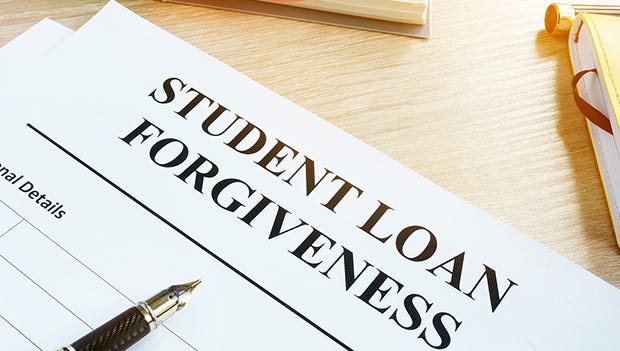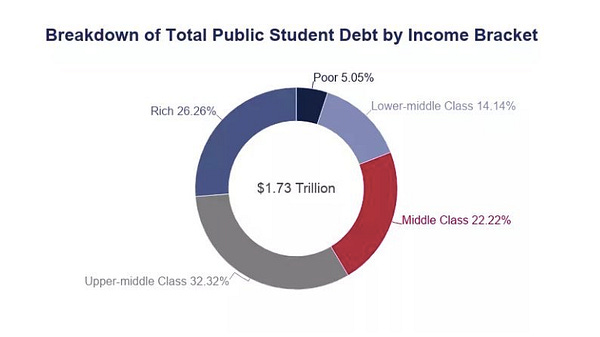Liz & Loans
Liz Cheney lost in Wyoming and the Biden administration passed a horrendous student loan bailout.
Welcome to The Burnett Breakdown! I apologize for missing the ball last week and not sending out a newsletter. It turns out that life gets busy when you have a newborn at home. Please subscribe if you haven’t already so that you never miss a newsletter.
I’m going to try a new format this week of writing briefly about a couple of different news stories. This will surely only increase the reading experience as you get to read my opinion on more than one topic, which is the end of the week that you didn’t even know you were missing.
Liz Loses
On the Tuesday before last, the Republican voters in Wyoming decided that they no longer wanted Liz Cheney to represent them in Congress. This was a widely expected outcome as Cheney has made herself the face of Republican resistance to Donald Trump. Harriet Hageman will replace Cheney as the sole representative of Wyoming in Washington D.C. assuming that she wins the general election, which she is projected to do by a landslide.
Typically, the Wyoming Republican primary for the U.S. House does not have nationwide implications; however, this race was viewed by many as illuminating the remaining influence of Donald Trump on the Republican Party. According to this view, Cheney’s loss proves that Trump is still the kingpin of the party and getting out of line with him is a political death sentence. Others claim that this race was more of an indictment of Liz Cheney because she is more concerned with helping Democrats by painting anyone who opposes her or the January 6th committee as anti-democratic, election deniers.
I think it’s pretty clear that Liz Cheney lost because she refused to shut up about Donald Trump and Republicans were tired of it. I think this is disgraceful. One can argue that Liz Cheney should have done what other politicians, like Glenn Youngkin or Brian Kemp, have done and simply ignore Trump. This probably would have led to Cheney staying in office to help reform the Republican Party from within. However, this is an argument over Cheney’s tactics, not content.
I don’t buy the argument that Wyoming Republicans agree with Cheney’s anti-Trump content but disagree with her tactics and therefore voted her out. If this were true, they would not have voted for the Trump-backed candidate who ran on her support for Trump.
This is an example of why I have so many issues with the Republican party today. Liz Cheney voted with Donald Trump 93% of the time and is a staunch conservative by almost any objective measure. Her only “flaw” was her unwillingness to let Republicans “move on” from Donald Trump, which made her a “tool” for the Democratic Party to use to beat Republicans with.
For 5 years, Liz Cheney did what she was supposed to do. She defended Trump when he needed to be defended, tiptoed around criticizing him, and focused on enacting conservative policies. Then, Donald Trump refused to concede to Joe Biden, tried to steal the election, sat idly by as a mob interfered in the peaceful transfer of power, and now demands blind loyalty to himself over everything else. Cheney, I believe, rightly sees Donald Trump as not only unconservative but as a toxic force that must be expelled from the Republican Party if it wants any hope of succeeding in the future.
Again, I understand people being annoyed with Cheney’s methods, but let’s not pretend that shunning Liz Cheney, and not Donald Trump, is going to make the Republican Party more conservative, healthy, or electable.
The College Bailout
This past Wednesday President Biden announced his plan to “forgive” student loans. According to the White House, the “Department of Education will provide up to $20,000 in debt cancellation to Pell Grant recipients" and “up to $10,000 in debt cancellation to non-Pell Grant recipients” with loans held by the Department of Education. No individual with an income over $125,000 or a married couple with a combined income of over $250,000 will qualify for debt cancellation. Also, the White House lowered the monthly amount that an individual will have to pay to 5% of discretionary income, which cuts in half the previous amount.
The Biden administration is using the Higher Education Relief Opportunities for Students (HEROS) Act of 2003 as the legal mechanism to cancel student loan debts. This law was passed in the wake of the 9/11 terrorist attacks and “authorizes the Secretary of Education to waive or modify any requirement or regulation applicable to the student financial assistance programs under title IV of the Higher Education Act of 1965 as deemed necessary with respect to an affected individual who… suffered direct economic hardship as a direct result of a war or other military operation or national emergency.” The Biden administration cited the COVID-19 pandemic as the national emergency that justifies the debt cancellation.
First, let’s start with the most important aspect of this policy: it’s completely unjust. While debt “cancellation” or student loan “forgiveness” may sound nice, the reality is that the debt is neither canceled nor forgiven. Rather, the money owed has been transferred from the individual who contractually agreed to pay it back to American taxpayers who made no such agreement. Not to mention, there are millions of Americans who sacrificed a lot in order to pay back their student loans and they will not receive any compensation for doing the right thing.
Second, the Biden administration’s claim that the HEROS Act gives it authority to cancel student loans is a stretch, to say the least. The law itself makes clear that it is meant to help those in the military or suffering from war, not civilians who made poor choices. Furthermore, this policy was implemented by the Biden administration without Congressional approval. In fact, the Biden administration couldn’t get Congress to cancel student loans which is why they had to thwart the Constitutional structure of our government and enact it unilaterally.
I know that I am a broken record on this, but the Constitutional structure of our government still matters. Too many times, administrations and voters are more concerned with policy outcomes and not the process by which policies were enacted. Back in 2020, Donald Trump did something similar when he declared the southern border a national emergency and redirected military funds to build a border after Congress explicitly refused to pass funding for it. I agreed with that outcome, but the process he took was damaging to our constitutional order. The same is true with Biden today. Even if I agreed with the policy outcome, the President isn’t a dictator and doesn’t get to rule by fiat.
Third, the policy itself is regressive. As the graph below (data here) shows, the poor and lower-middle class account for less than 20% of total student debt.
Nonetheless, people in these economic classes are going to have to pay for the college degrees of people who make more money than them. While many progressives still oppose the 2017 tax cuts because the tax cuts “only helped the wealthy,” they freely ignore the irony and hypocrisy of these student loan cancellations.
Fourth, the policy will incentivize (or at the very least not disincentivize) institutes of higher education from continuing to charge astronomical rates. When a student takes out loans, the college or university that they are attending gets the money upfront and doesn’t lose any money if the student cannot pay back the loan. The entity that gives out the loan is the one that is out of luck. In the case of most student loans, this is the federal government.
Colleges and universities can continue to jack up prices because the federal government will continue to foot the bill. By lowering the maximum amount that a person has to pay to 5% of discretionary income, the federal government will receive less payment and will be hamstrung on the amount it can force individuals to pay.
Finally, the Biden administration in its memo said, “The skyrocketing cumulative federal student loan debt—$1.6 trillion and rising for more than 45 million borrowers—is a significant burden on America’s middle class.” This was such a pressing concern that debt cancellation was needed, but the system that created the alleged need is left untouched. The amount of student debt is such a crisis that we must force taxpayers to cough up hundreds of billions of dollars to pay for it but not enough of a crisis to make sure it never happens again. That is insane.
Ultimately, Biden’s cancellation of student loan debt is unjust, unconstitutional, regressive, and unhelpful in preventing future bailouts.
God Bless,
Hunter Burnett




